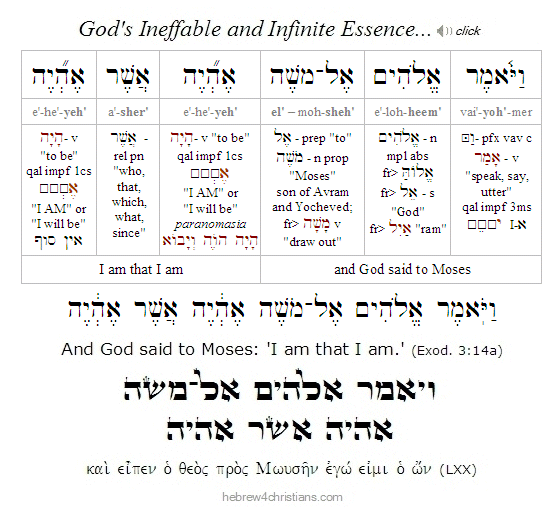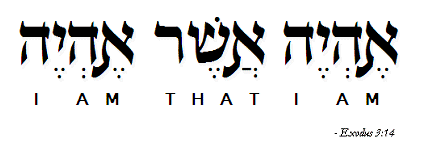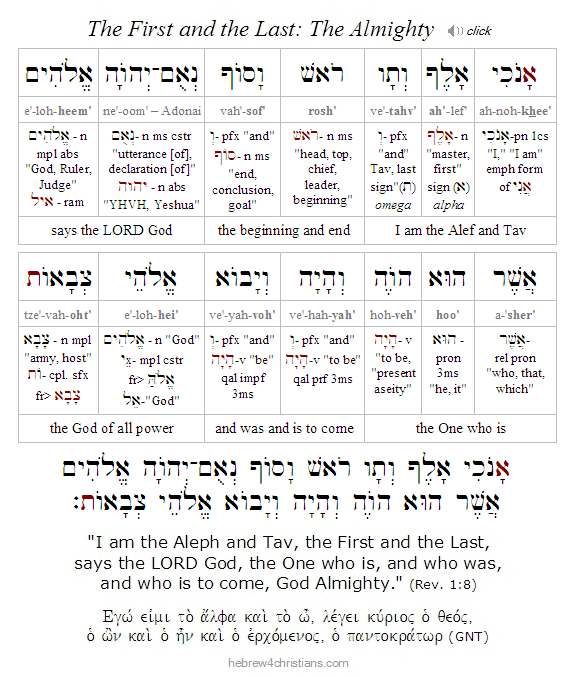|
Our Torah portion this week begins with God saying to Moses: "I appeared (וָאֵרָא) to Abraham, Isaac, and Jacob as El Shaddai (אֵל שַׁדָּי), but by my name the LORD (יהוה) I did not make myself known to them" (Exod. 6:3). Here we are faced with a puzzle, since the Torah clearly states that God revealed Himself as the LORD YHVH to the patriarchs. For example, to Abraham God said, "I am the LORD (אֲנִי יְהוָה) who brought you out of Ur of Kasdim" (Gen. 15:7), and to Jacob he said: "I am the LORD (אֲנִי יְהוָה), the God of Abraham your father and the God of Isaac (Gen. 28:13). In light of this, how then do we make sense of God's statement that He was not known as YHVH to the patriarchs? Does the Torah contradict itself, as some so-called "higher critics" of the Scriptures allege? Should we accept liberal scholarship that claims that the narratives were "pieced together" by a series of later editors (i.e., the JEDP theory)? Not so fast....
Instead of making the dubious inference that the different Names of God denote different authors of the Torah, it is better to regard the Scriptures as divinely inspired, with each word and phrase carefully preserved by the hand of God for its intended purpose. After all, Yeshua regarded the Torah this way (Matt. 5:18; John 10:33), as He did the rest of the Jewish Scriptures (Luke 24:44). Jewish tradition likewise maintains that the Torah has been meticulously preserved from the time of Moses to this day (comparing the texts of the Dead Sea Scrolls with the current Masoretic text of the Hebrew Scriptures validates this claim). If we reject the liberal assumption that the Torah was "redacted" by different editors (i.e., that it contradicts itself), we must assume that this verse is intended to teach us something...
We must remember that the Scriptures speak from an omniscient, "third person" perspective. When we read, for example, "In the beginning, God (אֱלהִים) created the heavens and the earth," we must ask who is speaking? Who is the narrator of the Torah? Jewish tradition maintains that Moses received the Torah by direct revelation from God while at Sinai, and that revelation included the infallible accounts of the lives of the early patriarchs. The New Testament elaborates that "all Scripture is inspired by God..." and is therefore the outworking of the Holy Spirit (2 Tim. 3:16; 2 Pet. 1:21, etc.).
The traditional Jewish commentators have said that God's statement (i.e., "I did not make my Name known to them") was actually a form of rebuke of Moses' request to know God's Name.... They connect this statement with the end of the last Torah portion, when Moses complained to God that He has made the situation of the Israelites worse (Exod. 5:22-23). The Talmud comments on the connection: "Many times I revealed myself to Abraham, Isaac and Jacob; but they did not question my ways, nor did they say to me, 'What is Your name?' You, on the other hand, asked from the start, 'What is Your name?' and now you are saying to me, 'You have not saved your people!' (Sanhedrin 111a). Rashi agrees with the Talmud's opinion: "You questioned my ways; unlike Abraham, to whom I said, 'Isaac shall be considered your seed' and then I said to him, 'Raise him up to me as an offering,' and yet despite all this he never questioned me." Similarly Nachmanides stated that the patriarchs were content to know God as El Shaddai, realizing that they could never fathom His essence, but Moses wanted to know the secrets of God and therefore asked for His Name.
There are two places in the Torah when God explicitly revealed the meaning of the name YHVH to Moses. Both occurred at Sinai. The first occurred at the outset of Moses' ministry (at the burning bush), and the second occurred after incident of the Golden Calf.
When God initially commissioned Moses to be Israel's liberator during the vision of the burning bush, he explicitly asked for "God's Name" in order to authenticate his message to the children of Israel. In response God answered, אֶהְיֶה אֲשֶׁר אֶהְיֶה / "ehyeh asher ehyeh" (Exod. 3:14). This phrase, often rendered as "I AM THAT I AM" in English, derives from the Hebrew verb hayah ("to be") and therefore indicates that God is the Source of all of life. In other words, the name YHVH appears to be a "play" on the verb "to be," and implies that God is hayah, hoveh, ve'yiyeh (הָיָה הוֶה וְיִהְיֶה), "the One who was, the One who is, and the One who always shall be," namely, the Master of the Universe. YHVH is the Source of all being and has life (being) inherent in Himself (i.e., He is necessary Being). Everything else is contingent being that derives existence from Him.
וַיּאמֶר אֱלהִים אֶל־משֶׁה אֶהְיֶה אֲשֶׁר אֶהְיֶה
וַיּאמֶר כּה תאמַר לִבְנֵי יִשְׂרָאֵל
אֶהְיֶה שְׁלָחַנִי אֲלֵיכֶם
vai·yo'·mer · E·lo·heem · el · Mo·she · e·he·yeh · a·sher · e·he·yeh
va·yo'·mer · ko · to·mar · leev·nei · Yees·ra·el
e·he·yeh · she·la·cha'·nee · a·le·khem

"God said to Moses, "I AM WHO I AM."
And he said, "Say this to the sons of Israel,
'I AM has sent me to you.'" (Exod. 3:14)
Download Study Card

Hebrew Lesson
Exodus 3:14a Hebrew reading (click):
Later, after Moses led the people back to Sinai, he ascended the mountain to receive the Ten Commandments and other details of the Torah. Before Moses reappeared from the mountain top, however, the people talked Aaron into making a molten calf (egel maseikhah) which they began to worship (Exod. 32:1-6). After the Jews had committed this grievous sin, Moses despaired of the Jews ever being able to find favor in God's eyes again. After a period of intercession and teshuvah, the LORD finally instructed Moses to carve a new set of tablets and to meet him again at a place (i.e., makom: מָקוֹם) on the top of Sinai, where He would descend in the cloud to "declare His Name" (Exod. 33:17-34:7). This dramatic experience of revelation was later called middot ha-rachamim, or the revelation of the attributes of God's mercy, and was considered a divine addendum to the original covenant terms (Exod. 34:6-7).
יְהוָה יְהוָה אֵל רַחוּם וְחַנּוּן
אֶרֶךְ אַפַּיִם וְרַב־חֶסֶד וֶאֱמֶת
Adonai Adonai el ra·choom ve·chan·noon
e·rekh a·pa·yeem ve·rav-che'·sed ve·e·met

"The LORD, the LORD, a God merciful and gracious,
slow to anger, and abounding in steadfast love and faithfulness"
(Exod. 34:6)
(Download Study Card)
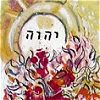
Hebrew Lesson
Exodus 34:6 Hebrew reading (click):
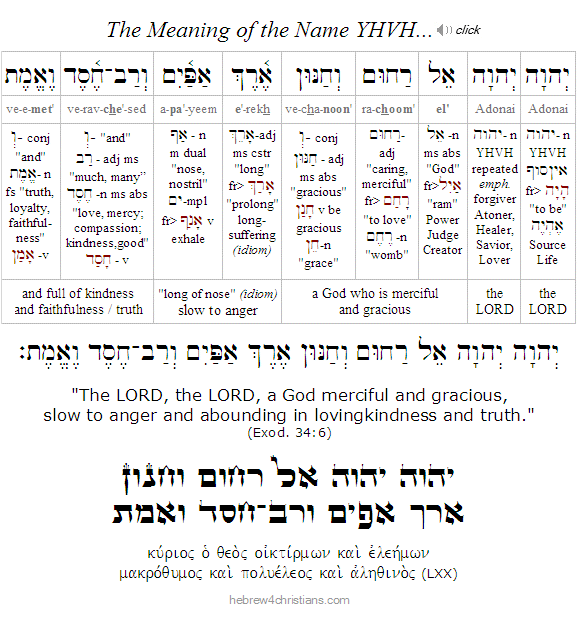 |
What are some of these attributes? Notice first that the LORD calls himself rachum v'chanun (רַחוּם וְחַנּוּן), often translated "merciful and gracious." The noun rechem (רֶחֶם) means "womb" in Hebrew, indicating that God's compassion is like a mother's deep love for her child. The word chanun (חַנּוּן) comes from the word for grace or favor (i.e., chen: חֵן), and indicates that God is a graceful giver who is favorably disposed to help those in need. God is compassionate and favorable to those who call upon Him. The curious phrase erekh apayim (אֶרֶךְ אַפַּיִם) literally means "long of nose," an idiom used to describe someone who is patient and slow to anger, i.e., "longsuffering" (Prov. 14:29). The word chesed (חֶסֶד), is often translated as "lovingkindess" or "steadfast love," and implies devotion and fidelity. God describes Himself as rav chesed v'emet (רַב־חֶסֶד וֶאֱמֶת), that is abundant in His kindness and faithful love. Based on God's Compassion, this is the meaning of the Name YHVH...
It is fascinating to see that this revelation prefigures the New Covenant that was given to Israel. Just as the first set of tablets, based as they were on the justice and holiness of God, were broken, so a second set was given based on the middot (attributes) of the LORD's mercy and grace. Indeed, Yeshua was broken on behalf of the law but was raised again so that all who trust in Him can truly understand that God is "merciful and gracious, slow to anger and abounding in stedfast love and truth" (Exod. 34:6, Psalm 86:15, 103:8).
It can be argued that the second revelation of the Name YHVH (יהוה) was a "gospel" moment for Israel. The episode of the Golden Calf revealed that the Jews were unable to keep the law, even though they personally experienced the power of God's deliverance from Egypt and His ongoing care on the way to Sinai. Despite the judgments brought upon Egypt, despite the overthrow of Pharaoh and his armies in the sea, despite the bitter waters made sweet, despite the manna from heaven, despite the miraculous well of Miriam, despite the awesome revelation at Sinai, and despite the pledge of the Israelites: kol asher diber Adonai na'aseh v'nishma, "All that the LORD has spoken we will do, and we will be obedient" (Exod. 19:8; 24:7), the Sin of the Golden Calf revealed that something more was needed, and that the law itself was insufficient to change the inner heart of man. The intercession of Moses on behalf of Israel revealed the heart of the New Covenant (בְּרִית חֲדָשָׁה) of the LORD, the deeper revelation of the LORD's character of mercy and grace. Apart from God's gracious love and compassion, the law by itself rendered only the righteous sentence of death for Israel.
All that has been said so far was intended to explore some reasons why the revelation of the Name YHVH was unique in the case of Moses, but what are we to make about the statement that patriarchs only knew God as El Shaddai?
First it should be noted that El Shaddai is a compound name that includes the (singular construct form of the) Name Elohim (אֱלהִים). It is certain that Abram understood that God was the Creator of the universe (הַבּוֹרֵא) even though he did not have a copy of the written Torah to read: "In the beginning, God (Elohim) created the heavens and the earth" (Gen. 1:1). For example, after he arrived in Canaan, he settled in Hebron and separated from his nephew Lot. He later fought against the four kings who had abducted his nephew and thereafter encountered Malki-Tzedek, the "priest of God Most High," in the city of Salem. There Malki-Tzedek blessed him in the name of "El Elyon (אֵל עֶלְיוֹן), the Owner of heaven and earth (קנֵה שָׁמַיִם וָאָרֶץ)," and there Abram swore a corresponding vow "to the LORD, God Most High, the Owner of heaven and earth" (Gen. 14:19,22). It is clear, then, that he understood God as the Creator and Master of the universe....
The name El Shaddai first occurs in the Torah when God said to Abram: "I am El Shaddai. Walk before me and be perfect. I will make my covenant between me and you, and I will increase your numbers greatly" (Gen. 17:1-2). Most English translations render El Shaddai as "God Almighty," probably because the translators of the Septuagint (i.e., the Greek translation of the Torah) thought Shaddai came from a root verb (shadad) that means "to overpower" or "to destroy." The Latin Vulgate likewise translated Shaddai as "Omnipotens" (from which we get our English word omnipotent). God is so overpowering that He is considered "Almighty." It is more likely, however, that the name Shaddai is connected to shadayim (שָׁדַיִם) the Hebrew word for "breasts," indicating sufficiency and nourishment. Indeed, the compound name (El Shaddai) is regularly connected with fruitfulness and fertility of the original families of Israel. For example: "May El Shaddai bless you and make you fruitful and increase your numbers" (Gen. 28:3); "I am El Shaddai: be fruitful and increase in number" (Gen. 35:11); "El Shaddai will bless you with blessings of heaven above, blessings of the deep that lies beneath, blessings of the breasts (shadayim) and of the womb" (Gen. 49:25). Understood in this light, the Name might derive from the contraction of sha ("who") and dai ("enough") to indicate God's complete sufficiency to nurture the families to become as "numerous as the stars of the heavens and the sands of the seashore." In fact, the Name first appears when God refers to multiplying Abraham's offspring (Gen. 17:2) and is used almost exclusively in reference to the three great patriarchs of Israel.
Furthermore, when Abram later interceded on behalf of Sodom, he appealed to the LORD as "the Judge of all the earth" / הֲשׁפֵט כָּל־הָאָרֶץ (Gen. 18:25). Abram surely understood El Shaddai to be the Most High God - Creator, Sustainer, and Judge. So it is evident that the patriarchs' theology centered on the Almighty Creator (Elohim) and His promise to sustain and multiply their offspring (El- Shaddai) to become a great nation and a blessing to all the families of the earth. God "appeared" to them as El Shaddai, but he was not "known" as YHVH at that time...
Finally, it is important to understand that the meaning of God's Name is linked to His actions in the created order. The very first occurrence of the Name YHVH in the Torah occurs in Genesis 2, where the name appears compounded with the name Elohim (i.e., YHVH-Elohim): "These are the generations of the heavens and the earth when they were created, in the day that the LORD God (יהוה אֱלהִים) made the earth and the heavens" (Gen. 2:4). The Torah goes on to describe how the LORD God imparted to man a divinely given soul: "Then the LORD God formed (יֵצֶר) the man of dust from the ground and breathed (נָפַח) into his nostrils the breath of life (i.e., nishmat chayim: נִשְׁמַת חַיִּים), and the man became a living soul (i.e., nefesh chayah: נֶפֶשׁ חַיָּה)." The word yetzer ("formed") refers to something shaped, like pottery fashioned by the hand of a potter. Just as a potter purposes a shape before forming an object, so God intended the image of man. Regarding the impartation of the soul, the sages use the analogy of a glassblower who creates a glass vessel. Just as a glassblower blows into a tube to form a vessel from molten glass, so the "breath of God" (i.e., neshamah: נְשָׁמָה) becomes spirit (רוּחַ) to form the human soul (i.e., nefesh: נֶפֶשׁ). The Targum states that God breathed into Adam the ability to think and to speak. In other words, thought and speech are two primary characteristics of the image (tzelem) and likeness (demut) of God. The very first creative act of YHVH-Elohim, then, was to impart the "image" of God to mankind. Interesting, it is only after the rebellion in Eden that the Name YHVH first appears by itself, suggesting a separation of the attributes of God's justice and God's mercy. (The return to Eden, i.e., salvation, ultimately means the restoration of the original image of YHVH-Elohim within mankind. This is why the Scriptures teach that we are being conformed to the image of Yeshua, who is YHVH in the flesh.) But notice something important here. The first explanation of the meaning of the Name YHVH concerns God's actions based on redemptive love.
The name Elohim first appears creating the heavens and the earth and therefore denotes God's transcendent power and glory as Creator and Judge, whereas YHVH denotes God's immanent love and compassion. When the Scripture therefore states, "Elohim...said: 'I am YHVH'" (Exod. 6:2), it is identifying the God of Justice with the God of Mercy: God the Creator is also the God the Redeemer... There is only one God, of course, as the Shema testifies: "Hear, O Israel, the LORD (יהוה) is our God (אֱלהִים), the LORD is one" (Deut. 6:4), but the one true God is both perfectly just and also perfectly compassionate. Unlike various forms of dualism which separate God's justice and mercy, the LORD God (יהוה אֱלהִים) unites both of these attributes into a unity, and this unity is most clearly demonstrated in the power of His redemptive love and salvation. Therefore we see the judgments revealed to polytheistic Egypt but the mercy shown to monotheistic Israel. Egypt needed to understand there is one God who is Creator and Judge, whereas Israel needed to understand that God is also the compassionate Redeemer and Savior. But notice that in either case escape from the "Angel of Death" (the symbol of God's justice and vengeance) would only come through faith in the shed blood of the Passover lamb. This, of course, foreshadowed the greater work of redemption given through Yeshua our Messiah, the sacrificial "Lamb of God." Yeshua reconciles God's justice and mercy so that may it be proclaimed: חֶסֶד־וֶאֱמֶת נִפְגָּשׁוּ צֶדֶק וְשָׁלוֹם נָשָׁקוּ - "love and truth have met, righteousness and peace have kissed" (Psalm 85:10). At the cross we see both God's wrath for sin as well as God's awesome love for us. The God of Israel is both "just and the justifier of those who believe" (Rom. 3:26). Putting your faith in God's redemption given through Yeshua means that you trust that His love for you is greater than his judgment against you. Your faith in His shed blood causes the wrath of God to "pass over" you...
When God said to Moses "but with my Name YHVH I did not make myself known to them" (Exod. 6:3), he was stating that the patriarchs had not witnessed His mastery over creation through the signs and wonders He would perform as Israel's Redeemer. The patriarchs understood God as El Shaddai (אֵל שַׁדָּי), the all-sufficient "Promise Maker" who nurtured the fledgling nation and who foretold of Israel's future, but Moses (and the Israelites) would now understand God's attributes of covenantal faithfulness (chesed) as the "Promise Keeper" by directly witnessing his revelation and saving acts. Rashi further states that the Name YHVH implies that there is no power that can prevent God from keeping His word and fulfilling His promise of redemption. God is the Lord of lords and King of kings, and therefore His word can never fail (Deut. 10:17; Dan. 2:47). אֵין עוֹד מִלְבַדּו / ein od milvado: "there is no power apart from Him" (Deut. 4:35,9; 1 Kings 8:60).
The LORD alone is Israel's Savior and Redeemer (Isa. 43:3, 44:6), and therefore Yeshua Himself is none other than the LORD (Eph. 1:7-8; Col. 1:13-20; Isa. 45:23, Phil. 2:10). Yeshua was the Angel of the LORD who spoke to Moses from the midst of the burning bush (Exod. 3:2-15), just as he later spoke to all of Israel from the midst of the fire at Sinai. The New Testament describes Yeshua as the "Aleph and the Tav, who is and who was and who is to come, God Almighty" (Rev. 1:8; cp. Rev. 2:8, 21:6, Isa. 44:6, etc.). For additional proof that the Scriptures teach that Yeshua is none other than YHVH "in the flesh," see the article entitled "Yeshua is Adonai."
אֲנִי הָאָלֶף וְהַתָּו ראשׁ וָסוֹף נְאֻם יהוה אֱלהִים
אֲשֶׁר הוּא הוֶה וְהָיָה וְיָבוֹא אֱלהֵי צְבָאוֹת
a·nee ha·a'·lef ve·ha·tav, rosh va·sof, ne·oom Adonai E·lo·heem
a·sher hoo ho·veh, ha·yah, va·va: E·lo·hei Tze·va·oht

"I am the Aleph and Tav, the First and the Last, says the LORD God,
the One who was, and is, and is to come: The God of Hosts" (Rev. 1:8)

Download Study Card
Hebrew Lesson
Revelation 1:8 Hebrew reading (click):
There are literally hundreds of Names and Titles of God given in the Scriptures, though surely the Name YHVH is the most profound and most powerful. Traditional Jewish theology calls God Ein Sof (אין סוף), "the Infinite" or "Boundless" (the Hebrew word ein means "there is not" and refers to "no-thingness," and the word sof refers to an end or limit, so the term "Ein Sof" suggests God's absolute transcendence from all forms of finite being). In other words, God is beyond all our predications, descriptions, and apprehension. God's "inner essence" or nature is concealed from us and is therefore unknowable. This is similar to other forms of "negative theology," where we can only say what God is not, rather than what God is. Thus to say "God is omnipotent" means that God is not powerless; to say "God is omniscient" means that God is not ignorant, and so on. God's "attributes of action," on the other hand, represent His self-revelation. These include the attributes of Creator, Redeemer, Sustainer of life, etc. To affirm that "God is Creator" is therefore to affirm the revelation of God's actions (namely, Scripture and creation itself); to say "God is Redeemer" is to affirm His saving acts in history (i.e., the Exodus and the Cross of Yeshua). Most of the Names and Titles of God are therefore descriptions of God's attributes of action, though the Name YHVH is regarded as the sole exception.
It would be nice to read the words of YHVH printed in red in our Bibles, just as the words of Yeshua are sometimes so printed in the New Testament. Whenever we read YHVH's words in the Tanakh (i.e., "Old Testament"), it is important to remember that it is Yeshua, the Word or Voice of the LORD God Almighty, who is speaking.... Yeshua delivered Israel from Egypt; Yeshua gave the Torah to Israel at Sinai; Yeshua sheltered the Israelites in the wilderness, and so on. Yeshua is Israel's Savior and Redeemer. He is the One who died as the "Lamb of God" for Israel's ultimate redemption, and indeed for the redemption of the entire world. Indeed, Yeshua is YHVH is Melekh Ha-Kavod (מֶלֶךְ הַכָּבוֹד), "the King of Glory"!
מִי עָלָה־שָׁמַיִם וַיֵּרַד
מִי אָסַף־רוּחַ בְּחָפְנָיו
מִי צָרַר־מַיִם בַּשִּׂמְלָה
מִי הֵקִים כָּל־אַפְסֵי־אָרֶץ
מַה־שְּׁמוֹ וּמַה־שֶּׁם־בְּנוֹ כִּי תֵדָע
mee · ah·lah - shah·mah'·yeem · vai·ye·rad?
mee · a·saf-roo'·ach · be·chof·nav?
mee · tzah·rar-ma'·yeem · ba·seem·lah?
mee · he·keem · kol-af·sey-ah'·retz?
mah-she·mo · oo·mah-shem-be·no · kee · tei·da?

"Who has ascended to heaven and come down? Who has gathered the wind in his fists? Who has wrapped up the waters in a garment? Who has established all the ends of the earth? What is his name, and what is his son's name? Surely you know!"
(Prov. 30:4)
Hebrew Study Card

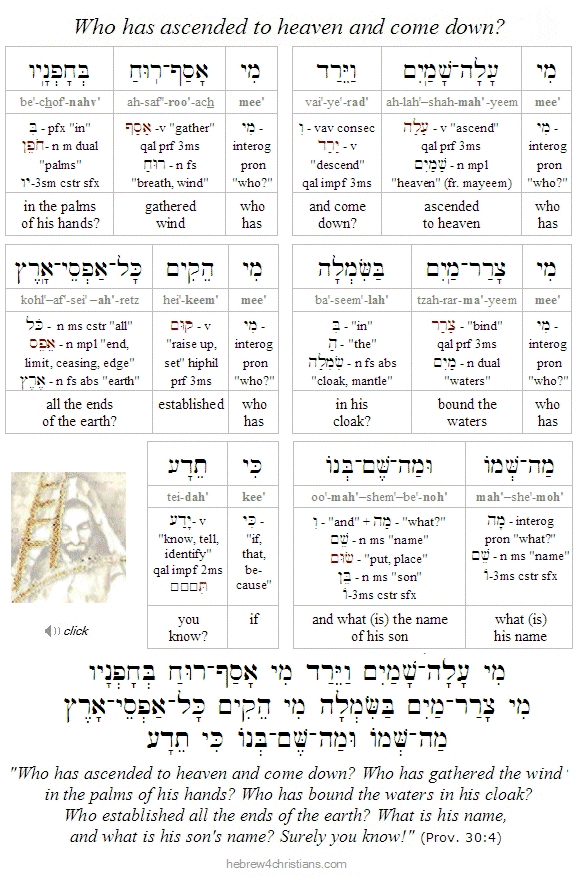
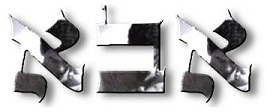
Related Topics:
|




